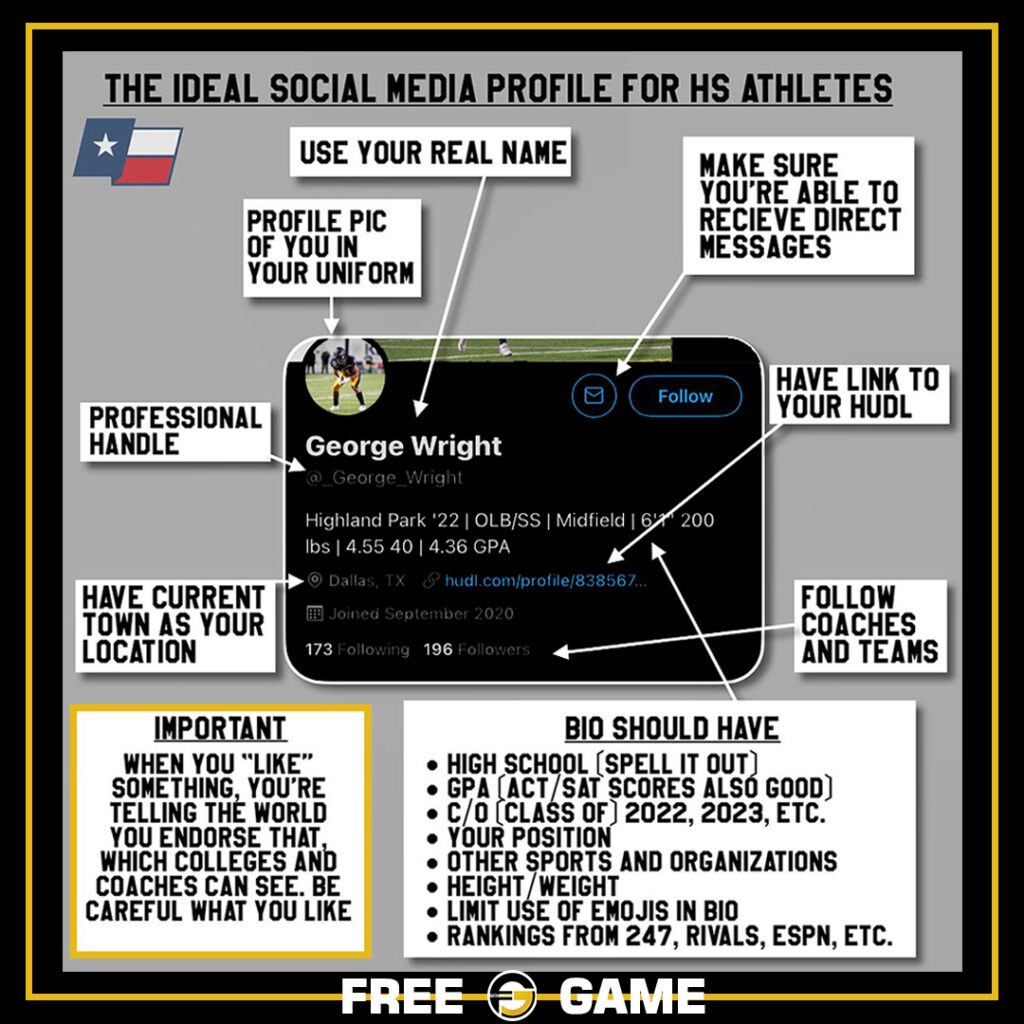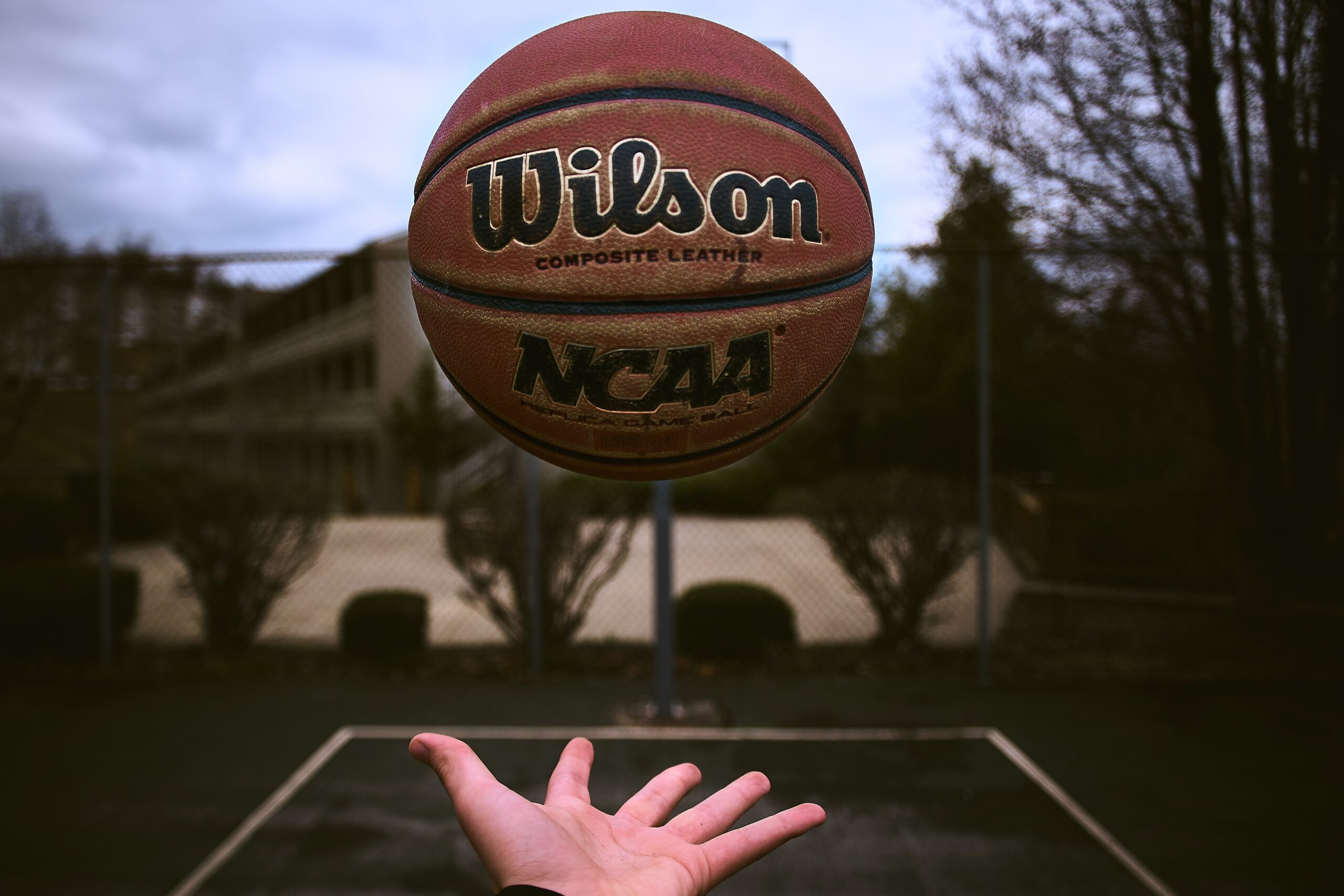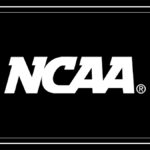
The Free Game Program guide for how every student-athlete should be using social media during the college recruiting process.
It seems like there’s a new social media application that pops up every day. Whether it’s Instagram, Twitter, Facebook, or any of the other apps typically on our phones, learning how to navigate social media as a student-athlete is extremely important for two main reasons. First, student-athletes can use social media to promote themselves to colleges. Second, social media can keep players and parents updated on your school, sport, and other important information.
Parents, we at Free Game Program understand that your first instinct may be to protect your child from social media as long as possible. While we do agree that you should approach the internet in general with caution, we do encourage you to be a part of your prospective student-athlete’s online story early. Coaches at every level are on social media helping to promote and recruit players.
With that in mind, we want to give you some tips for navigating social media as a student-athlete in the recruiting process.
Include important information in your bio.
No matter what social media platform you choose to promote yourself on, it’s important to include pertinent information about yourself in your bio as a student-athlete. The first things you want a college coach or scout to see when they get to your page are your:
- Full legal name
- High School
- Class
- Position
- Height
- Link to your highlight tape
Be sure to use a nice, clear photo of yourself for your profile picture so that coaches can identify you on film. Today, tons of coaches recruit student-athletes via online streams of games so they should know what you look like. Your name, class, and height will slowly but surely become the way college coaches keep up with you throughout your career. If you don’t have a highlight tape, keep reading into the next section of this post.

Every student-athlete needs a highlight tape for social media.
One of the main tools you’ll ever need as a student-athlete is an updated highlight tape. We suggest that around the 7th or 8th grade, student-athletes get an updated highlight tape every year.
In a study, 85 percent of college coaches surveyed by Cornerstone Reputation said their staff conducted online research of recruits. So, if coaches are on social media, you want them to see what you can do!
Student-Athletes should avoid all profanity on social media.
When college coaches and scouts are browsing social media, it’s not only to see what type of player a student-athlete is, it’s also to see what type of person they are. Coaches want players who have the character, work ethic, and habits of leaders. College programs have social media pages as well and use their pages to promote on and off-court success of their student-athletes. So as a student-athlete it’s best if there is no profanity included in your online representation via social media platforms.
Profanity use on behalf of the student-athlete is hardly ever the case. While most players know not to use profanity on social media, we at Free Game Program feel like we should tell you again.
Students-athletes, if you want to be recruited, avoid using profanity on your social media platforms. This includes profanity in captions, posts, videos, etc. Also, profanity use on your social media doesn’t always come from you. Be weary of ‘liking’ or ‘retweeting’ content with excessive uses of profanity, as college coaches can see these engagements on your profile as well.
Student-athletes should share their game clips and statistics on social media.
Players, no matter your sport, you can always use social media to post your game statistics. There are likely media outlets in your district that cover high school sports. Follow them and if you have a particularly good game, search their pages to see if they mentioned your performance. If so, you can retweet or repost the content to show college coaches and scouts what you’re up to.
A few final tips: Be positive! Show your personality! Remember that social media is your brand!
There can sometimes be a lot to remember. We’re here to help. If you have any questions, as always, reach out to us here at any time. Follow us on our social media handles @freegameprogram.

Every student-athlete and parent involved in the college recruiting process should know what’s permitted in each of these recruiting periods.
There is a ton to think about during the college recruiting process. As a student-athlete, there’s your physical and mental health, grades, a social life, your sport, and ultimately getting recruited. As a parent, there’s travel costs, college applications, and more. A part of getting recruited is knowing when, where, and how to go about doing so. Free Game Program has you covered.
Every prospective NCAA student-athlete and parent must abide by certain rules to maintain their eligibility. This post won’t go into specific dos and don’ts. Instead, it will give you definitions for what each recruiting period means.
What is a contact period?
During a contact period, a college coach may have face-to-face contact with a college-bound student-athlete or their parents. They may watch student-athletes compete and visit their high schools, and write or telephone student-athletes or their parents.
What is an evaluation period?
During an evaluation period, a college coach may watch a college-bound student-athlete compete, visit their high schools, and write or telephone the student-athlete or their parents. However, a college coach may not have face-to-face contact with college-bound student-athletes or their parents off the college’s campus during an evaluation period.
What is a quiet period?
During a quiet period, a college coach may only have face-to-face contact with a college-bound student-athlete or their parents on the college’s campus. A coach may not watch student-athletes compete (unless a competition occurs on the college’s campus) or visit their high schools. Coaches may write or telephone college-bound student-athletes or their parents during this time.
What is a dead period?
During a dead period, a college coach may not have face-to-face contact with a college-bound student-athlete or their parents, and may not watch student-athletes compete or visit their high schools. Coaches may write and telephone student-athletes or their parents during a dead period.
For more information or if you have specific questions, we’re always here to help! Email us here info@freegameprogram.com or follow us on any of our social media handles @freegameprogram.





